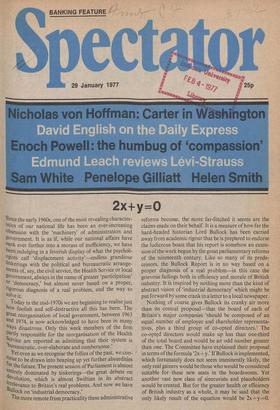2x+y-0
Since the early 1960s, one of the most revealing characteristics of our national life has been an ever-increasing Obsession with the 'machinery' of administration and government. It is as if, while our national affairs have sunk ever further into a morass of inefficiency, we have been indulging in a feverish display of what the psychdl°gists call 'displacement activity'—endless grandiose tinkerings with the political and bureaucratic arrange'tents of, say, the civil service, the Health Service or local government, always in the name of greater 'participation' Or 'democracy,' but almost never based on a proper, rigorous diagnosis of a real problem, and the way to solve it.
Today in the mid-1970s we are beginning to realise just bOW foolish and self-destructive all this has been. The great reorganisation of local government, between 1963 and 1974, is now acknowledged to have been in many Ways disastrous. Only this week members of the firm r2artly responsible for the reorganisation of the Health ervice are reported as admitting that their system is bureaucratic, over-elaborate and cumbersome.' Yet even as we recognise the follies of the past, we connue to be drawn into heaping up yet further absurdities tor the future. The present session of Parliament is almost eptirely dominated by tinkerings—the great debate on u. evolution, which is almost Swiftian in its abstract relevance to Britain's real problems. And now we have bullock on 'industrial democracy.' The more remote from practicality these administrative reforms become, the more far-fetched it seems are the claims made on their behalf. It is a measure of how far the hard-headed historian Lord Bullock has been carried away from academic rigour that he is prepared to endorse the ludicrous boast that his report is somehow an extension of the work begun by the great parliamentary reforms of the nineteenth century. Like so many of its predecessors, the Bullock Report is in no way based on a proper diagnosis of a real problem—in this case the grievous failings both in efficiency and morale of British industry. It is inspired by nothing more than the kind of abstract vision of 'industrial democracy' which might be put forward by some crank in a letter to a local newspaper.
Nothing of course gives Bullock its cranky air more than its central proposal—that the board of each of Britain's major companies 'should be composed of an equal number of employee and shareholder representatives, plus a third group of co-opted directors.' The co-opted directors would make up less than one-third of the total board and would be an odd number greater than one. The Committee have explained their proposal in terms of the formula `2x-hy: If Bullock is implemented, which fortunately does not seem imminently likely, the only real gainers would be those who would be considered suitable for these new seats in the boardrooms. Yet another vast new class of sinecurists and placeholders would be created. But for the greater health or efficiency of British industry as a whole, it may be said that the only likely result of the equation would be 2x±y=0.










































